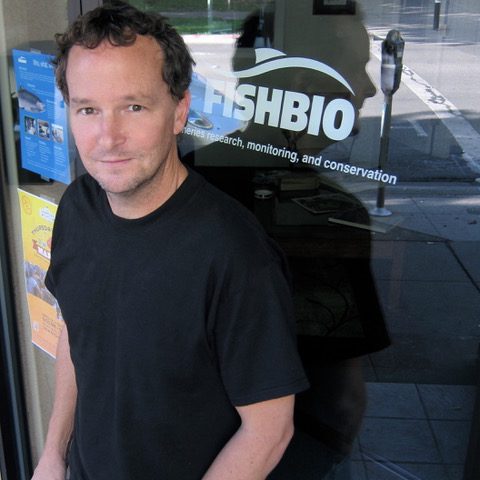


Doug Demko is the President and founding member of FISHBIO, an environmental consulting firm specializing in fisheries research, monitoring, and conservation. Trained in fisheries biology and environmental law, Doug’s 25 years of experience in fisheries studies, facilitation, and negotiation have earned him the reputation of a regional fisheries expert in fishery flow and Endangered Species Act issues. He currently advises large water coalitions, private corporations, city and county governments, and environmental groups on a variety of fisheries and water resource management issues. Doug has advised and worked with various politicians and their staff, has testified before the U.S. House of Representatives in Washington, D.C., the California State Legislature, and regularly before the California State Water Resources Control Board.
Doug’s expertise includes fish life-history research and assessment; fish passage assessment; and fish population dynamics of California native fishes, estuarine species, and introduced species. Doug has led a variety of field research projects including mark-recapture studies to evaluate survival and entrainment, mortality and behavioral studies, limiting factor analyses, salmonid outmigration and survival characterizations, and abundance and distribution analyses. His extensive experience with fish population assessment and state-of-the-science technologies has led to new and innovative approaches in the field of salmonid research. Doug holds a bachelor’s degree in biology from California State University, Chico, and a J.D. from CalNorthern School of Law.
Eschenroeder, J.C., M.L. Peterson, M. Hellmair, T.J. Pilger, D. Demko, and A.Fuller. 2022. Counting the parts to understand the whole: Rethinking monitoring of steelhead in California’s Central Valley. San Francisco Estuary and Watershed Science, 20(1). DOI: 10.15447/sfews.2022v20iss1art2
Peterson, M.L., D.J. Lee, J. Montgomery, M. Hellmair, A. Fuller, and D. Demko. 2020. Stability in reproductive timing and habitat usage of Chinook salmon across six years of varying environmental conditions and abundance. Fisheries Management and Ecology 2020;00: 1–18. DOI: 10.1111/fme.12421
Pilger, T., M. Peterson, D. Lee, A. Fuller, and D. Demko. 2019. Evaluation of long-term mark-recapture data for estimating abundance of juvenile fall-run Chinook salmon on the Stanislaus River from 1996 to 2017. San Francisco Estuary and Watershed Science 17. DOI: 10.15447/sfews.2019v17iss1art4
Patricio, H.C., S.A. Zipper, M.L. Peterson, S.M. Ainsley, E.K. Loury, S. Ounboundisane, and D.B. Demko. 2019. Fish catch and community composition in a data-poor Mekong River subcatchment characterised through participatory surveys of harvest from an artisanal fishery. Marine and Freshwater Research 70(2): 153-168. DOI: 10.1071/MF17338
Peterson, M.L., A.N. Fuller, and D. Demko. 2017. Environmental factors associated with the upstream migratory activity of fall-run Chinook salmon in a regulated river. North American Journal of Fisheries Management 37: 78-93. DOI: 10.1080/02755947.2016.1240120
Cuthbert, R., S. Ainsley, and D. Demko. 2011. Salinas Basin Juvenile O. mykiss Outmigration Monitoring 2011 Final Report. Prepared by FISHBIO for Monterey County Water Resources Agency. September 2011.
Simpson, M.L. and D.B. Demko. 2004. Migration characteristics of juvenile salmonids in the Calaveras River: 2002-2004. Prepared by S.P. Cramer & Associates for Stockton East Water District. 23 pp.
Demko, D., Simpson, M., Sonke, C. 2003. Use of a portable resistance board weir to count and characterize runs of anadromous salmonids in the Stanislaus River. Interagency Ecological Program. Vol. 16(4): 40-43.